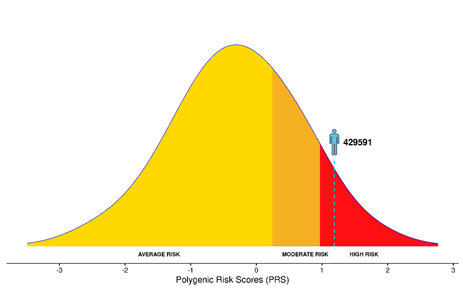
KardioGen from MedGenome
- Acute coronary incidents have become very common with patients below the age of 45 years complaining of angina and heart attack
- Considering the high incidence of CAD, the availability of a more precise method of prediction is a key public health requirement
- Polygenic Risk Score (PRS) is a score that analyses multiple genetic loci to give a prediction of disease risk. The KardioGen genetic screening test is based on PRS and is designed to estimate the polygenic risk of an individual to acquire CAD

Coronary Artery Disease
Coronary Artery Disease (CAD) is a heart condition that affects the blood vessels that supply oxygenated blood to the heart, the coronary artery, and its branches. These arteries are blocked due to deposition of plaque preventing oxygenated blood supply to the heart. A partial or complete block leads to an Acute Coronary Syndrome (ACS),
e.g. heart attack/angina/MI, all of which can be fatal.
Prevalence in India
- There has been a recent, exponential rise in the number of CAD cases and earlier onset of the disease (<40 years of age) in India
- 54.5 million people are estimated to be suffering from Cardiovascular disease in India 5
- The risk of CAD in Indians is nearly 3-4 times higher than Caucasians 1
- Risks in the Indian populations is 11% for non-diabetic patients and 21.4% for diabetic patients 1, 2,
CAD is a complex disorder caused by inherited genetic risk, environmental factors and lifestyle. Strong family history, distinctive disease patterns, higher prevalence of comorbidities, such as diabetes and hypertension, at a much younger age have been some of the noteworthy features of CAD in the Indian population.
Young onset CAD, which affects people who are less than 45 years of age, is getting more and more common. especially in South Asians. Recent studies show about 1.2% of CAD cases are young onset, whereas in South Asians/Indians 5% to 10% of CAD cases are young onset. Together it is concluded that Indians are more vulnerable to have CAD in young age group.
Given the high disease burden and increased risk of CAD in the Indian population, effective strategies are needed to predict the risk of CAD in patients much before symptoms occur.
What is the MedGenome Polygenic Risk Score Test?
- It is a screening test that helps estimate the genetic predisposition of an individual to develop Coronary Artery Disease
- The risk is calculated from >6 million3 genetic markers implicated in the disease and is given as a validated Polygenic Risk Score (PRS)
- The score indicates if the individual is at high and average genetic risk
- MedGenome’s test is validated for the South Asian population4
What is Polygenic Risk Score?
Genetic research over the past decade has realized that our risk for many common conditions such as heart disease and diabetes are not influenced by just one gene, or even a handful of them. Instead, multiple genes work in tandem to influence our risk for diseases.
Many small-effect genetic variations contribute to a person’s susceptibility to CAD. Polygenic Risk Score prediction quantifies the contributing effects into a score and estimates whether the tested individual is at a high and moderate risk of CAD.
How accurate is the test in predicting CAD?
- In South Asians/Indians young onset CAD is seen in 5% to 10% of the population compared to global average of 1.2%
- CAD PRS is highly sensitive to picking up young onset CAD with ~90% positive predictive value4. This mean 90% of times the test was able to predict high risk for individuals who had a coronary event before 45 years of age
- CAD PRS has a 29% sensitivity rate for young onset CAD4
Who should take the CAD-PRS test?
- Individuals with a family history of CAD or familial hypercholesterolemia
- Individuals with high lifestyle risk i.e. with hypertension, diabetes, smoking habits, alcohol consumption, stressful lifestyle, etc.
- All individuals above the age of 35 years, with comorbidities like hypertension, diabetes or elevated blood cholesterols
- All individuals above the age of 45 years
- All individuals who are concerned about their genetic risk of developing CAD
Why should you take this test compared to existing test options?
Existing risk predictions are based on modifiable factors like a person’s health conditions, blood profiles and self-reported family history. The variability in this information contributes to the ambiguity of the risk prediction
CAD PRS is an independent genetic predictor and is free from ambiguities. The test is based on a person’s genetic makeup and predicts their risk profile
Knowing a person’s risk can help in timely life style changes, health monitoring and disease management
What is the test process?
What does one do after receiving the CAD score?
| CAD Risk Profile | What it means? | Action |
|---|---|---|
| High | You are at a higher genetic risk (3 times)of getting CAD than a low risk counterpart | Take a comprehensive heart check up and consult your doctor for an invasive procedure |
| Moderate | You are at a higher genetic risk (~1.5 times) towards CAD than a low risk counterpart | Avoid all lifestyle risks such as smoking, stress, etc. Maintain normal blood pressure and blood sugar levels with regular monitoring. Medication, such as blood thinners can be considered |
| Average | You are at a not high genetic risk towards coronary events | Maintain a healthy lifestyle and get routine health checkups |





 Enquire
Now
Enquire
Now